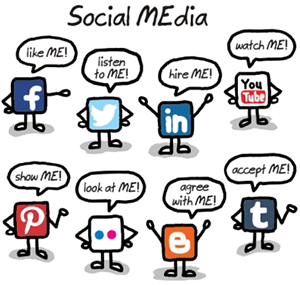By 2017, Facebook had over 2 billion active users. Social media sites have not only become used by most people with Internet access, but the amount of social media platforms have increased exponentially: Twitter, Tumblr, Google+, Snapchat, Pinterest, LinkedIn, Reddit, Instagram. The genius of social media is a platform to create and share content with others. Most often, social media will include a user account, a profile, a newsfeed, a network of ‘friends’/ connections, a comments or feedback facility. The primary use of social media is mostly forms of entertainment, interacting with others, sharing content, and ‘keeping up’.
The Traps and Idols of Social Media
1. Boasting and Self-Promotion
Much of what goes on on social media is little more than boasting. Parading one’s travels, purchases, children, grandchildren, spouse, all takes place routinely. Staged, and sometimes doctored pictures of oneself are supposed to support the glamour of Me. As the Tabloids follow celebrities, so Facebook provides tabloid news coverage for every person. Kevin Bauder: ”In other words, it allows every user a small sphere within which she or he can act like a celebrity…Facebook is an opportunity to put one’s self on display continually”

This is simply known as narcissism: being in love with yourself. Many people, when using Facetime or Skype, are looking at themselves far more than the person they’re supposed to be talking to. Many people upload pictures and info, mostly to see the reaction it will get from others. Social media offers you the opportunity to build and portray an image of yourself as near-perfect, so as to be fawned over, flattered and validated by a circle of friends. In polite conversation, talking about nothing except your own life would be considered rude. Social media, of course, demands that you do that. The line between showing pictures of the children for Granny overseas and showing everyone how wonderful my life is is a fine one.
The difference between sharing and showing off is something the technology usually flattens out. Certain events are treasured memories to be shared with particular people. But when ‘overheard’ by everyone, the nature of the sharing changes. Social media allows us to thinly veil our self-promotion under the guise of “good times!” “so thankful!” “feeling so blessed”
“Pride goes before destruction, and a haughty spirit before stumbling”; “Let another man praise you and not your own mouth; a stranger, and not your own lips”; “If you have been foolish in exalting yourself . . . put your hand over your mouth.” (Prov 16:18; 27:2; 30:2).
2. Exhibitionism and Voyeurism
Facebook encourages you to share personal, even intimate, details with ‘friends’, who may be little more than acquaintances. The fact that a ‘friend’ becomes a silent witness of your self-broadcasts creates a strange situation of exhibitionism and voyeurism. An exhibitionist is one with a compulsive desire to get other’s attention, and display what should be hidden, while a voyeur is a prying observer, secretly watching what is private for the sordid or the scandalous. Facebook and social media creates unwitting exhibitionists and invited voyeurs.

Facebook encourages me to focus on sharing personal moments with the few who have some right to see, and to forget the many who do not. Facebook encourages me to peer into someone’s life, and to forget that I have very little reason to do so with most. Posting a picture of my wife for everyone to comment on is not that far from setting up a screen outside my wall and live-streaming what goes on in my house. The essence of modesty is to understand that what is not for other’s consumption is to be kept veiled. Shamelessness has taken over when we are comfortable to be gawked at, or to gawk at others. The nature of loving relationships is a voluntary, mutual, progressive self-disclosure (Eph 5:12).
– David De Bruyn, Professor of Church History, Shepherds’ Seminary Africa


